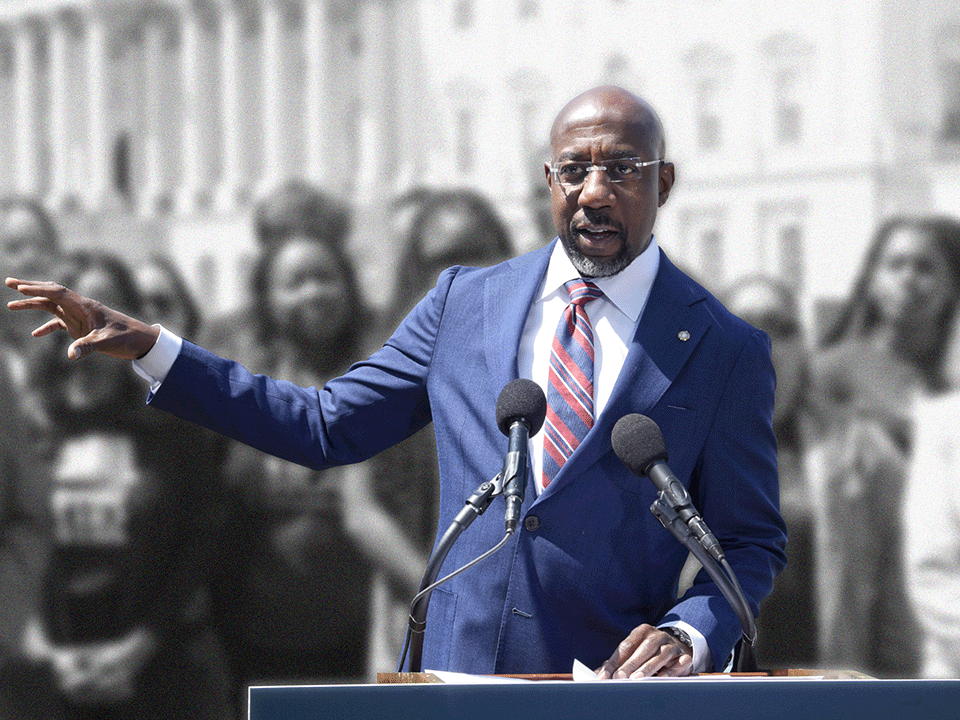Senator Raphael Warnock on the Mental Health Crisis in Schools
"Young people today have pressures that I didn't face as a kid growing up in the '80s, pressures we didn't even know about."
There's no denying that students today are dealing with a whole lot of ~unprecedented times~ and it's taking a serious toll on their mental health. Here, podcast host Sammy Jaye sits down with Senator Reverend Raphael Warnock to talk about his proposed legislation aimed at addressing this mental health crisis.
Heads up: You can watch the full interview on our YouTube channel.
Sammy Jaye: On May 31st, you proposed a new piece of legislation called The ASSIST Act: Advancing Student Services in Schools Today (ASSIST) Act. What inspired you to introduce this piece of legislation and how do you think it will affect students' mental health in school?
Senator Raphael Warnock: I have long been focused on the issue of mental health and making sure our students have all of the support and the resources that they need to succeed. And young people are under a lot of stress and a lot of pressures today. We're dealing with the isolation of the pandemic. I think we still have not accounted for the impact of that pandemic on our mental health—everybody.
SJ: In the process of getting this passed, how have you seen the response been so far? Has it been positive from both sides of the aisle? Have you received any pushback?
RW: Well, I think mental health is an issue that's bigger than partisan politics, right? And I think for every parent out there, whether you're someone who's a teacher in a school or nurse or a plumber or someone who is in Congress. I'm the father of two small children myself—I have a seven year old and a four year old. And I look at what's happening with young people today—the high rates of suicide, the depression—it's something that we cannot afford to ignore. And so I'm focused on building a kind of bipartisan coalition to getting this over the finish line. And that's why I introduced The ASSIST Act.
SJ: How do you think the tools that students receive from The ASSIST Act will translate to their lives outside of school?
RW: My bill will address the fact that there are just so few resources in our schools, not nearly enough counselors. And what we will do in this bill is provide the resources for schools to both attract and retain mental health counselors and providers, and hopefully young people will see the benefits of that, which then are important for all aspects of their lives. So we see it in schools, but, look, at the end of the day, we want to see young people go out into the world and thrive. We want to see them start businesses. We want to see them embrace a career, a discipline that excites them. And there's nothing like seeing a young person who has that spark in their eye because they've found that thing that excites them, their passion.
SJ: I recently read your book A Way Out of No Way: A Memoir of Truth Transformation and the New American Story. And in chapter one you said, "The love and support and validation I got from my family shaped how I saw myself and the world around me." For so many people growing up, they don't have that at home and they go to school for that. How will your legislation give students the support and validation they need when they're at school?
RW: I had two incredible parents. My father's deceased. My mom gratefully is still with us. But even for young people who have parents at home who are very supportive, sometimes you need more. Sometimes there's a disconnect. There's the tension that almost inevitably comes with growing up and finding your own voice and your own sense of agency and autonomy in those spaces and places. For a lot of people, it was a teacher. For others, it was a guidance counselor or a school nurse or a principal.
I think of Gwen Goodman, who was my high school principal growing up. She was this short, little, diminutive woman, but powerful, such a powerhouse. She was no nonsense. She didn't take any stuff, but we all knew that she loved us and she wanted the best for us. And that's why I think that people who work in schools—whether they're teachers or guidance counselors, sometimes even the school janitor—they're there for our kids. But my bill provides that people who have this particular expertise in providing mental health support are right there in our schools to give our kids the support that they need. And I can't think of anything that's more important than that.
SJ: Do you have any advice to help students with the fear that we're under and how to maintain faith in a time of such uncharted territory?
RW: What I would say to people: Keep the faith and keep fighting. And I don't say that in a glib way. These struggles are not easy. They're just that—it's a struggle. And I acknowledge that young people today have pressures that I didn't face as a kid growing up in the '80s, pressures we didn't even know about. We thought those were tough times, right?
But not long ago, I was literally on the floor of the United States Senate urging my colleagues to do something on the issue of gun safety and gun violence. We had witnessed what happened in Uvalde—Congress did pass some legislation after that, which helps, but it's not enough. We see mass shooting after mass shooting. We've had more mass shootings this year than we've had days this year. And so, not long ago, I was on the floor of the Senate addressing the issue of gun violence, and while I was giving a speech on the floor of the Senate, my own two precious children—ages seven and four—were in a school lockdown because there was a gunman at a medical center in Atlanta. And out of an abundance of caution, the schools in the area were on lockdown.
I talked to my daughter later on that day because I wasn't sure if she knew what had happened. She was at the time in the first grade, And I said, "How was school today?" And she said, "Dad, we were on a lockdown." I said, "Really? What happened?" She said, "There was a bad man with a gun. And so the whole school had to go on lockdown and I was helping. I was comforting my friends and telling them how to hide."
I thought about that because I remember my dad asking me: "What happened at school today?" And not once did I have to say to my dad there was a gunman. I didn't know what a lockdown was. I never heard of a lockdown. But this post-Columbine generation... And now we're going into the second generation after Columbine, and Congress has done precious little to address this issue. So I want to be clear: I'm focused on the gun safety issue too.
SJ: It wouldn't be right for us to have this conversation and not ask you: How is your mental health doing? How are you taking care of yourself?
RW: That's right. We have to check on each other. I don't know—I decided to run for Senate, so maybe we ought to examine what kind of person signs up to do this kind of work! No, seriously, I enjoy my work and I'm doing fine. And that's because I have a community of support and I've got people who do just what you just did, who check in. So let's keep checking in with one another.
Wondermind does not provide medical advice, diagnosis, or treatment. Any information published on this website or by this brand is not intended as a replacement for medical advice. Always consult a qualified health or mental health professional with any questions or concerns about your mental health.




